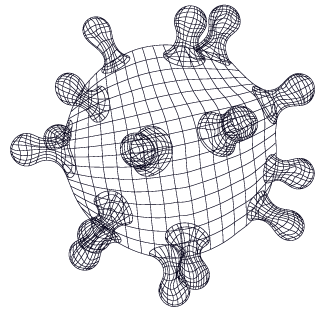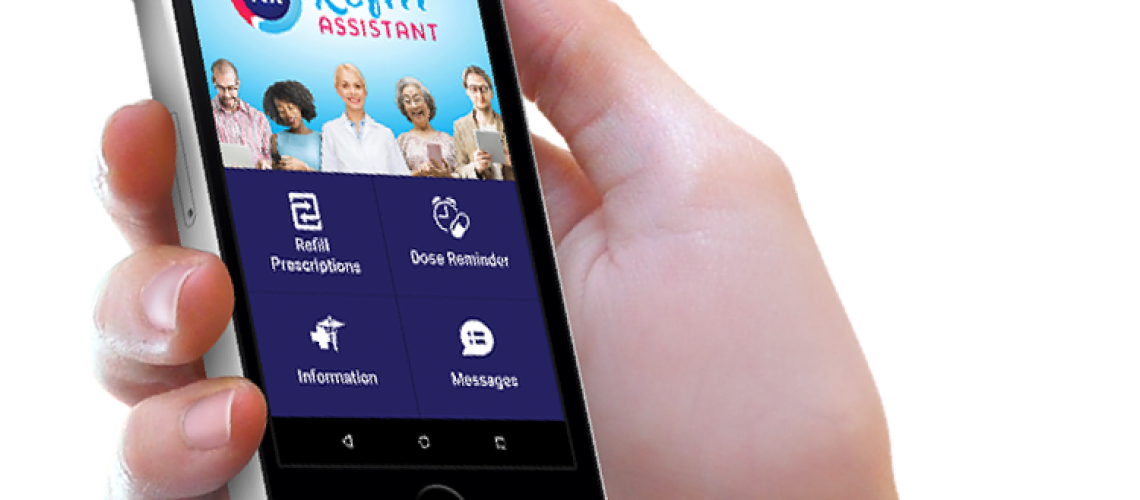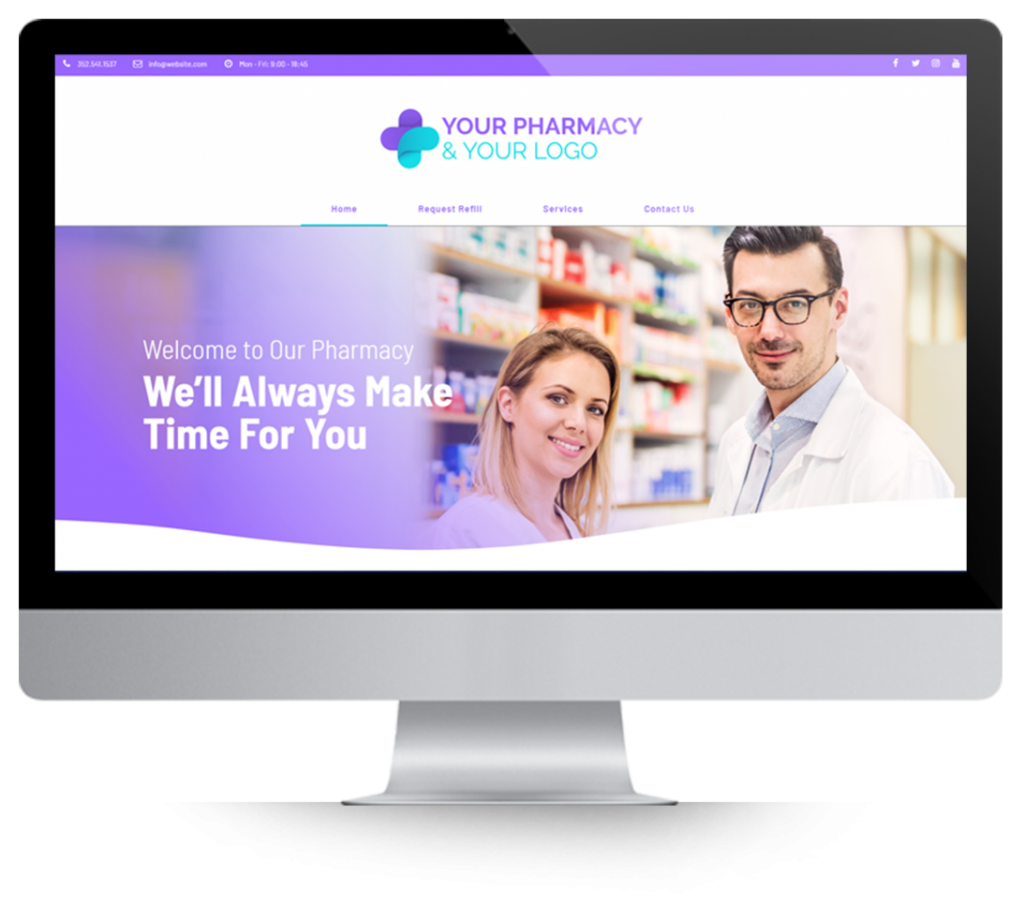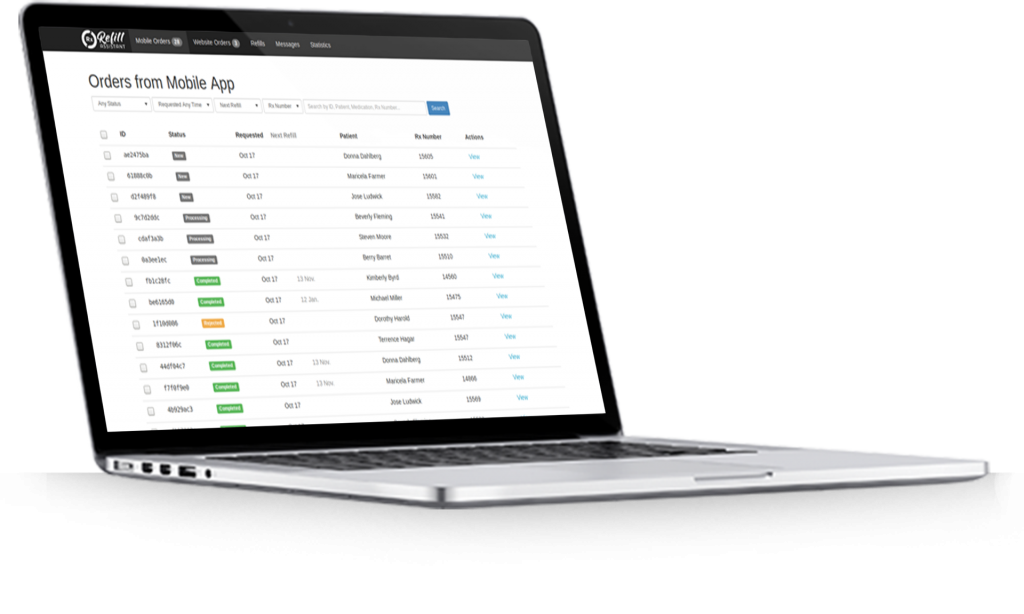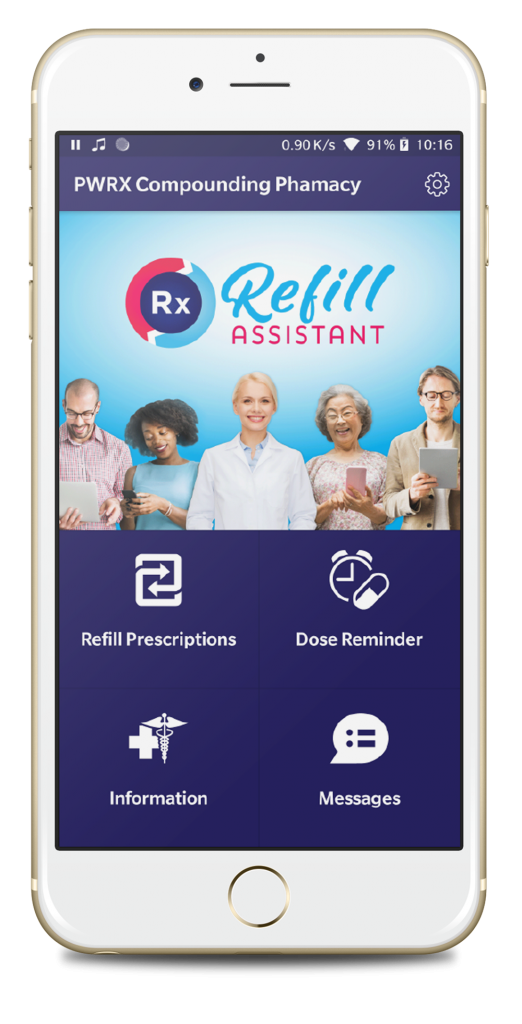There are many reasons why independent pharmacies buy the Refill Assistant prescription app for their business.
For example, some see that patients are always on their cell phone and believe therefore that their pharmacy should be there too.
Additionally, some wish to transform their business like CVS which used a pharmacy app to re-position itself from a drug store chain to a provider of innovative health services.
Also, younger patients are seen to be less loyal to a given pharmacy. Therefore, forward-looking pharmacies aim to increase loyalty to their business for younger patient demographics, by allowing them to request an online prescription through their own Rx app.
We decided to ask pharmacists using our pharmacy apps, what are the main benefits of integrating the app into their business. This is what we found.
Number 1 on the list was:
1. Reduce call volume
Reducing both inbound and outbound call volume was seen as a major benefit.
The benefits were tangible in terms of less call volume & duration and included more intangible items such as reduced disruption, better concentration, and smoother workflow.
Members found a reduction in phone call volume and duration for phone calls such as
Refill reminders
Prescription receipt confirmation
Rx dispensed confirmation
For pharmacies with a proactive refill process, patients with outstanding refills required 1-3 calls per refilled script. Applying average call center metrics, it takes 8 minutes to get through to and have a meaningful conversation with 1 person. This calculation incorporates calls that did not complete; calls that went to voicemail; rang out; incorrectly dialed numbers and successful call completions.
Depending on the refill process, that equates to 8 to 24 minutes per refill/month.
Even 8 minutes adds up fast. If you have 50 refill reminder calls a day that will take about 3.5 hours/day to complete. Phone time that can be used more productively in the lab, expanding your business or spending time on consultations.
If the refill process requires 2 or more calls, the call duration and costs increase by a proportional amount.
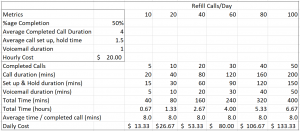

Reducing call volume was closely followed by………..
2. Increase refills
Refills make up a significant percentage of an independent pharmacy’s recurring revenue.
In advance of using our pharmacy app, our customers either had a phone-based refill process with dedicated staff; a more ad-hoc system with whoever was available to make calls or had no refill process whatsoever.
The poll found that the average duration between refills before using the Rx app was 45+ days.
Reviewing our data across multiple pharmacies, we came up with an example refill profile.
65% of refill reminders are scheduled to be sent within 30 days
30% of refill reminders are scheduled to be sent between 31-60 days
5% of refill reminders are scheduled to be sent between 61-90 days
For such a refill reminder profile, the overall average refill should be 41.8 days. But in reality refill orders are often late and customers have suggested by over 3 days on average.
By reducing the average refill period from over 45 days to a 41.8-day target, an improved refill process can yield >7% refill revenue increase AND more importantly improve patient outcomes.
Compounding
In particular, members liked how the refill reminder feature worked for a compounding pharmacy. When setting up Refill Assistant, you can define your lead-time. This is the number of days your pharmacy needs to prepare and deliver an order.
Refill Assistant will notify the patient this many days in advance of their refill running out.
For example, if the lab takes 48 hours to prepare and dispense the compound plus you normally ship with UPS 2 day service, then you can set the lead-time at 4 days.
If the Days Supply in the pharmacy management system is 30 days and your Refill Assistant lead-time is set at 4 days, then the reminder is sent to the patient after 26 days.
Another feature that members mentioned is how Refill Assistant reports data on refill non-compliance. Importantly, this information can be used to create a refill-escalation process that sends additional reminders to patients.
Due to the fact that significant numbers of pharmacies offer compounded medications, simplifying the Labs Workflow came in at number 3. For those pharmacies, it possibly has a greater impact than either Reduced Calls or Increased Refills.
3. Simplify the lab’s workflow
Compounding is a full-on business and the lab can be under a lot of pressure to produce safe and quality compounded drugs in a short time. Any opportunity to simplify the lab’s workflow, reduce bottlenecks or improve throughput can help significantly.
This is where Refill Assistant’s integration with PK Compounder Rx is best in class.
With Refill Assistant, refills land in the to-do list; refill reminders are generated by the Days Supply in PK Compounder Rx and additionally patients receive a message when an item is ready. This is all handled automatically with no staff intervention required.
To give you an idea of how Refill Assistant can improve the lab’s workflow, we have compiled the major PK <> Refill Assistant integration points below.
Integration points
Refill Assistant works with all the PK Compounder Rx workflows including RxWatch and Location Tracker.
The rx app has been modified with a quick refill section directly connected to PK Compounder.
When the patient enters a script number and date of birth into the app, Refill Assistant requests PK Compounder to verify the patient and the script.
If everything is valid, the rx app sends the refill into the PK To Do list. Plus the app is updated with relevant details about the script. If there is an issue with the script, the patient is sent a message outlining the issue.
If a script has expired, the patient gets a message to “Call the Pharmacy”.
If Refills remaining=0, the patient receives an alert that the Pharmacy will call the doctor and will contact the patient if needed.
The app auto-updates the script number when a pharmacist uses the command Create a New Script from Old in PK Compounder Rx.
Refill reminders are sent automatically to patients based on Days Supply in PK.
The lab’s compounding and delivery lead-time can be factored into the refill reminder so the reminder can be sent early to the patient.
At the Completion Station, PK sends Refill Assistant a “dispensed” message. The patient is sent a push message alert confirming it is ready. The alert contains information on the selected delivery mechanism.
In PK Compounder Rx, scripts coming from the app are highlighted with an Rx Mobility flag.
The flag is also included on the Refill Reminder, Log of Scripts and Data Mining reports in PK.
4. Direct to Patient Marketing Channel
Patients who download the pharmacy app are the most engaged, most loyal customers with continued repeat business. In order to engage with these patients, Refill Assistant includes a direct-to-patient marketing channel.
You can easily send push messages about events, promotions, offers or educational content to the 1000+ people that download the app of most mid-size pharmacies.
If you’d like to know more about our Refill Assistant pharmacy app packages, check out our page
